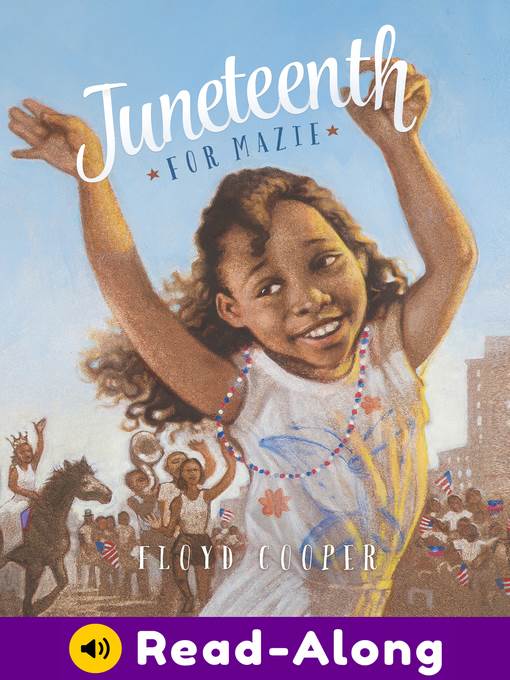
Juneteenth for Mazie
فرمت کتاب
ebook
تاریخ انتشار
2015
Lexile Score
660
Reading Level
2-3
ATOS
3.6
Interest Level
K-3(LG)
نویسنده
Floyd Cooperناشر
Capstoneشابک
9781623704827
کتاب های مرتبط
- اطلاعات
- نقد و بررسی
- دیدگاه کاربران
نقد و بررسی

January 1, 2015
K-Gr 3-June 19, 2015 will mark the 150th anniversary of the day the Emancipation Proclamation made it to Texas (two years after the rest of the country heard it). This title offers context for that occasion, hailed as "Juneteenth." Cooper's signature oil wash and eraser technique elevates the presentation beyond the purely instructional. Like some of his predecessors who told this story (Valerie Wesley, Carol Boston Weatherford, etc.), this author frames the history of freedom in Texas with a present-day family's commemoration. Mazie is a young African American who bristles at age-related limits, such as cookie consumption and bedtime. Her father mentions that she will have a chance to celebrate tomorrow; explaining that her restrictions aren't so terrible, he says: "Well, Great, Great, Great Grandpa Mose heard 'no' even more." As he narrates, listeners see the profile of a boy in an endless cotton field, a man and woman running toward the North Star, the proclamation being read from a Texan balcony. Mazie's father covers ensuing civil rights' milestones, declaring, "Black people still struggled to stand shoulder to shoulder with White people." Cooper depicts the Selma to Montgomery March, a schoolroom, a church, and the rear view of a historic inauguration, making this a useful title for a bird's-eye perspective of the subject. For a treatment that focuses solely on that long ago day in Texas and imagines what the impact of the announcement would be on one slave family, see Angela Johnson's All Different Now (S. & S., 2014).-Wendy Lukehart, District of Columbia Public Library
Copyright 2015 School Library Journal, LLC Used with permission.

November 1, 2014
A father shares an important holiday with his daughter.Mazie is unhappy because it is bedtime, and she would much rather stay up. She snuggles up to her father, who tells about a big celebration that will occur tomorrow-"on a day we call Juneteenth." It begins with "Great, Great, Great Grandpa Mose," who is a slave in the cotton fields until June 19, 1865, when freedom is finally proclaimed in Galveston, Texas. Dancing and celebrating in the streets greet the news. Equality does not necessarily follow, but the day is always remembered. Protests, education and forgiveness, continues the father in his narration, are part of the story, which culminates with the inauguration of Barack Obama. He promises Mazie a day of good food, fun and remembrance. Cooper's story is straightforward and aimed at an early-elementary audience, but it provides sufficient information to use with older children as an introduction to Juneteenth, which is marking its 150th anniversary in 2015. His full-page artwork-oil paintings in softly textured yellows and browns-captures the tender relationship between a father and daughter and the sadness and pride of their family story. Broad sweeps of history are encapsulated in double-page spreads focusing on determined, prayerful and happy faces. A quiet and informative picture of belated emancipation. (afterword) (Picture book. 4-9)
COPYRIGHT(2014) Kirkus Reviews, ALL RIGHTS RESERVED.

February 1, 2015
Grades K-3 I bet you're tired of hearing no' all the time, her father says to grumpy Mazie. Well, Great, Great, Great Grandpa Mose heard no' even more. Mentioning freedom several times but slavery only in an endnote, Mazie's dad describes how people who sweat, struggled, bled, and cried burst into celebration when a proclamation from a brave president was read one June day. It wasn't the end of struggles, he explains, but Mazie will have a chance to celebrate that great day with barbecue and strawberry pop, and to remember. In his customary gauzy gold-and-brown illustrations, Cooper sandwiches historical images of figures picking cotton, fleeing north to freedom, and marching over a bridge, between contemporary scenes of Mazie snuggled up next to her dad, and dancing in a festive parade. One final view of her kneeling reverently precedes a brief afterword that fills in some blanksthough not mentioning that red food is actually a traditional part of the holiday. Other introductions to Juneteenth are more detailed, but this will give even young readers a glimmer of its significance.(Reprinted with permission of Booklist, copyright 2015, American Library Association.)

























دیدگاه کاربران